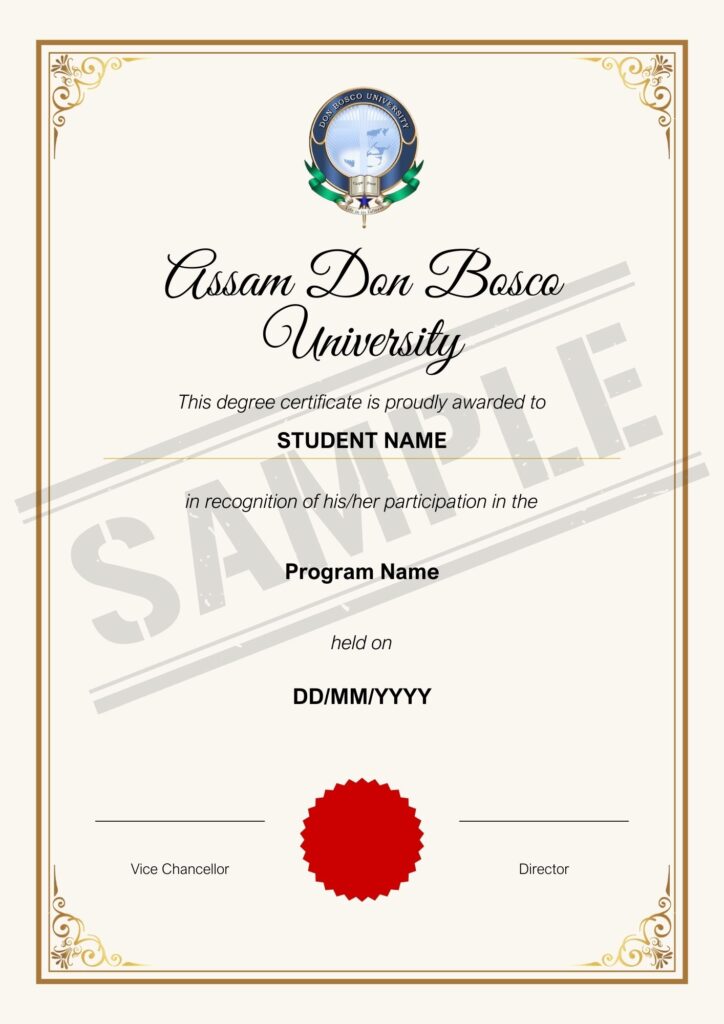Test Program
B.tech in Electrical & Electronics Engineering
Duration: 04 Years
No. of Seats: 60
B.Tech in Electrical and Electronics Engineering
The B.Tech in Electrical and Electronics Engineering at Assam Don Bosco University is a comprehensive four-year program designed to provide students with a strong foundation in electrical systems, electronics, and modern power technologies. The program emphasizes practical knowledge, ensuring students are prepared to solve real-world challenges in the energy, automation, and electronics sectors. Students gain hands-on experience through well-equipped laboratories and industry projects, fostering innovation and critical thinking. With a curriculum that integrates core electrical engineering principles with emerging technologies like renewable energy and smart grids, the program prepares graduates to contribute to sustainable and advanced solutions. The faculty, with academic and industrial expertise, ensures that students are equipped with the latest skills to thrive in a rapidly evolving technological landscape.

Program Highlights and Advantages
Discover our Degree Programs and begin an exciting educational journey

Industry-Driven Curriculum
Tailored to meet real-world electrical and electronics demands.

Advanced Facilities
Access to cutting-edge labs and research equipment.

Emerging Technologies
Focus on renewable energy, automation, and smart grids.

Expert Faculty
Learn from experienced professors with academic and industry backgrounds.
Program Overview & Structure
| Engineering Mathematics I |
| Engineering Chemistry |
| Engineering Physics |
| Communicative English I |
| Basic Electrical Engineering |
| Engineering Mechanics |
| Computer Programming |
| Engineering Chemistry Lab |
| Engineering Physics Lab |
| Computer Programming Lab |
| Engineering Drawing I |
| Workshop Practice I |
| Communication Practice Lab I |
| Engineering Mathematics II |
| Engineering Chemistry |
| Engineering Physics |
| Communicative English |
| Basic Electronics |
| Advanced C and Data Structures |
| Elements of Mechanical and Civil Engineering |
| Engineering Chemistry Lab |
| Engineering Physics Lab |
| Basic Electrical Engineering Lab |
| Engineering Drawing II |
| Advanced C and Data Structures Lab |
| Communication Practice Lab II |
Engineering Mathematics IIICircuit Theory and NetworksElectronic Devices and CircuitsObject Oriented ProgrammingElectrical and Electronic MaterialsEconomics for EngineersCircuit and Networks LabElectronic Devices and Circuits LabObject Oriented Programming lab
| Engineering Mathematics IV |
| Digital Electronics and Logic Design |
| Electro-Magnetic Theory |
| Electro-Mechanical Energy Conversion I |
| Electrical and Electronic Measurements |
| Organisational Behaviour |
| Digital Electronics and Logic Design lab |
| Electro-Mechanical Energy Conversion Lab I |
| Electrical & Electronic Measurements Lab |
| Mini Project |
| Engineering Mathematics IV |
| Communication Techniques |
| Computer Organisation and Architecture |
| Relational Database Management Systems |
| System Programming |
| Organisational Behaviour |
| Digital Computer Design lab |
| Computer Organisation and Architecture Lab |
| System Programming Lab |
| RDBMS lab |
| Microprocessors and Microcontrollers |
| Basic Communication Systems |
| Control System Engineering |
| Electro Mechanical Energy Conversion II |
| Electrical Power Systems I |
| Project Management |
| Microprocessors & Microcontrollers Lab |
| EMEC II Lab |
| Control and Simulation Lab |
| Mini Project |
| Signal Processing |
| Power Electronics and Drives |
| Electrical Power Systems II |
| High Voltage Engineering |
| Analog Integrated Circuits |
| Production & Operations Management |
| Power Electronics and Drives Lab |
| Analog Integrated Circuits Lab |
| Digital Signal Processing Lab |
| Mini Project |
Communication System EngineeringAdvanced Control System EngineeringPower System ProtectionQuality Management SystemsArtificial IntelligenceElectivesDigital Image and Speech ProcessingUtilization of Electrical EnergyPower Plant EngineeringCommunication Systems LabControl System Engineering LabIndustry Training SeminarMajor Project (Phase I)
| Mobile Communication |
| Electrical Drives |
| Thoughts That Shape the World |
| Financial Management and Accounting |
| Electives |
|---|
| Energy Audit and Management |
| Optoelectronic Devices |
| Power System Operation and Control |
| Major Project (Phase II) and Viva Voce |
Degree offered by us

Minimum Eligibility Criteria
Passed Higher Secondary School Leaving Examination (or equivalent) with 50% of the aggregate and 50% of the aggregate of Physics, Maths and Chemistry/Computer Science
OR
Passed Diploma (in Engineering and Technology) examination with at least 50% marks (subject to vacancies in the First Year, in case the vacancies at lateral entry are exhausted).
JEE(Mains), any State Entrance Test or the Don Bosco University Graduate Entrance Test
BTech - Honours
Students admitted to a four-year B.Tech degree course will be offered a provision of earning B.Tech with Honours in some emerging areas of the same department. For this, students found to be eligible as per University norms will require to earn a minimum of additional 18 to 20 credits in the specified area in addition to the credits essential for obtaining an Undergraduate Degree in the major discipline (i.e., 160 credits).
BTECH - Lateral Entry
Limited seats are available for direct admission into the third semester of BTech for Diploma Holders from AICTE approved Polytechnics and BSc (PCM) graduates.
Eligibility Criteria
Passed Diploma examination with at least 60% marks in ANY branch of Engineering and Technology
Passed B.Sc. Degree from a recognized University as defined by UGC, with at least 50% marks and passed 10+2 examination with Mathematics as a subject
Career Impact
How We Help You Build Your Dream Career
R&D Roles
Opens doors to research and development positions in top industries.
Industry Expertise
Equips for careers in power generation, automation, and electronics.
Global Opportunities
Prepares graduates for international career prospects.
Entrepreneurship
Lays the foundation for launching successful tech ventures.
F.A.Q.
Supporting Subheading
The university offers a range of undergraduate, graduate, and doctoral programs across disciplines including engineering, science, arts, business, and health sciences. Each program has its own specific requirements and areas of focus.
You can apply online through our university’s admissions portal. Complete the application form, submit the required documents (such as transcripts, test scores, and recommendation letters), and pay the application fee. Detailed instructions are available on our admissions webpage.
Admission requirements vary by program. Typically, undergraduate programs require a high school diploma and specific academic credentials, while graduate programs may require a bachelor’s degree in a related field, relevant test scores, and work experience. Be sure to review the specific requirements for the program to which you are applying.
Yes, the university offers a variety of scholarships and financial aid programs based on academic merit, financial need, and other criteria. Information about available scholarships and how to apply is available on the university’s financial aid webpage.
Application deadlines vary depending on the program and the intake period (e.g., fall, spring). Be sure to check the program’s admissions page for specific deadlines.
